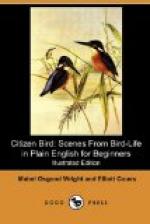As he spoke a flock of twenty or more birds flew over; some were the bright-yellow males and others the more plainly colored females. They did not fly straight, but in a jerky way, constantly dropping down and then lifting up again, and calling out “wait for me” on every down-grade curve, until by common consent they alighted among some wild grasses, where the early yellow thistles were already going to seed.
“Watch and listen,” said the Doctor, as he handed the field-glass to the children in turn.
There was a perfect babel of bird-talk, the jaunty blond males all making pretty speeches to the gentle brown-haired females, who laughed merry little bird-laughs in return.
“It is like the noise in the store where they sell Canaries,” whispered Nat, after taking a long look; “first they all sing together and then a few sing so much louder that the others stop. I wonder what they are saying?”
“They are talking about housekeeping,” said the Doctor. “Some of the ladies say they prefer high apartments in a tree-top, while others like one-story bushes the best; but all agree that the ground floor is too damp for the health of their families. In a few days, or a week at most, this merry flock will have parted company, and two by two the birds will begin housekeeping.”
“Why, they are pulling off the thistle-down, and gobbling it up. I should think it would choke them,” said Dodo.
“Those are some of the fly-away seeds that Rap spoke of a moment ago. The fluff is not the seed, but a sort of sail to which the seed is fastened, that the wind may blow it away to another place to grow. If you look carefully you will see that the birds do not eat thistle-down, but only the seed; they will soon use the down to line their pretty round cup-shaped nests.” “Oh, yes,” said Dodo, “there are lots of fluffy seeds, and they mostly belong to very bad weeds. Olive has been telling us about them, Uncle Roy, and so of course the Goldies do heaps of good by eating them. If they eat those weed-seeds and do not need insects they can live here all winter—can’t they, uncle?”
“Certainly; they gather in flocks after their nesting-time, which you see is very late. Then the males shed their bright-yellow feathers, and look exactly like their wives and children. Still, they make a merry party flying about in the garden and field edges, where the composite flowers have left them food, whispering and giggling all day long—even singing merrily now and then. They often have hard times in winter, and when I am here at the Farm I always scatter canary seed on the snow for them.”
“What is a com-pos-ite flower?” asked Dodo.
“A kind of flower which has a great many little blossoms crowded together in a bunch, so that they look like one big flower—such as a dandelion, thistle, or sunflower. Olive will tell you more about them to-morrow. She is the Flower Lady, you know—I am only your Bird Uncle, and if I mix up flowers with birds I shall be apt to confuse you.”




